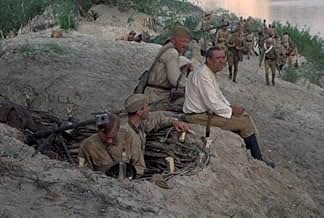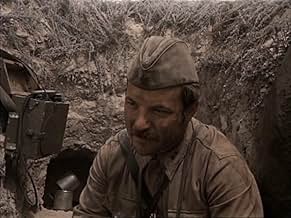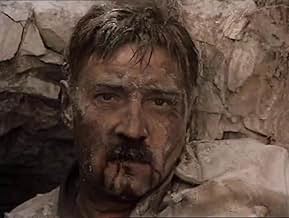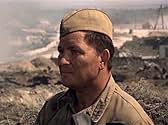Oni srazhalis za rodinu
- 1975
- 2h 38min
Aggiungi una trama nella tua linguaJuly 1942. Soviet forces are retreating in the face of a massive German onslaught towards Stalingrad. An infantry platoon is tasked with holding a vital hill in order to give their comrades ... Leggi tuttoJuly 1942. Soviet forces are retreating in the face of a massive German onslaught towards Stalingrad. An infantry platoon is tasked with holding a vital hill in order to give their comrades time to cross the Don River and regroup.July 1942. Soviet forces are retreating in the face of a massive German onslaught towards Stalingrad. An infantry platoon is tasked with holding a vital hill in order to give their comrades time to cross the Don River and regroup.
- Regia
- Sceneggiatura
- Star
- Premi
- 3 candidature totali
- Glikeriya
- (as Lidiya Fedoseeva)
Recensioni in evidenza
This is a great war movie. As with all Sergei Bondarchuk films this is a movie that makes you think and feel by showing you what its like to be a lone man in a huge situation. We get to go inside the heads of the various characters and we see what its like to be in battle. The battle scenes are good as the Russian soldiers simply try to survive the strafing, the bombing and to keep the Germans far enough away that they don't have a good chance at killing them.
In someways this film reminded me of Terrence Malicks's Thin Red Line which used similar techniques at times (for example: subjective camera, manipulation of the soundtrack, disjointed flashback.) Actually this movie reminded me of several other war films produced after its release and I'm curious if film makers like Francis Ford Coppola and others studied copies of this all but impossible to see film when they made things like Apocalypse Now.
As good as the film is it isn't perfect. The film can come off as a bit too "rah rah" for mother Russia at times, even though the film ultimately speaks to the larger question of defending one's own home land. The film also is a bit unfocused in the second half as the film takes some odd turns; then again the second half has some of its most powerful imagery with the young nurse trying to save the wounded man in the bomb crater and the return of one soldier from hospital.
See this movie. Its a great great war war film which only suffers when compared to some of the gems in the Sergei Bondarchuk back catalog of films.
The film looks great. It's amazing how Bondarchuk can translate a world to film and still make it feel very real. The production is great, except for some minor things (tank turrets don't move). When I watched this film, I got the feeling that the whole world was at war. Not only these soldiers somewhere in Russia, but that they were just small parts in a big world conflict.
Most people always complain about the acting in Russian movies. That doesn't go for this one. It all feels very natural. The pain they show looks real, their sweat is there and I cannot imagine it with other actors (or acting method). Sergei Bondarchuk himself plays a role and he shows that he cannot only direct, but also act.
What I loved the most, is that this film shows war as I think it is. There are humans, the enemy is just a dot far away and every fight there are losses. Russians and Germans bleed alike. The Soviet flag is shown and it's clear who we are supposed to root for, but the main characters aren't heroes. They fight because they are told too, not because they are tough.
The music is like the music of War and Peace; not really pleasant to listen to, but it's perfect for the film. When an act of horror is shown, voices rise as if they complain. A requiem to humanity.
They Fought for their Motherland is bit like Spielbergs Saving Private Ryan; only without the misplaced heroism and with that touch of humanity.
Maybe not for everyone (since their is a delicate balance between spectacle, humanity and of course philosophy), but when you are looking for more aspects of war than just the heroic stereotype combat, go for this.
The film concentrates on a small number of individual regimental soldiers fighting within a larger battalion on the Russian Steppes in 1942. We are shown not noble soldiers and distinguished officers of the "glorious" Red Army, but ordinary fighting men. They are hungry, dirty, mentally and physically drained. Also, they are exhausted by their continuous 12 months retreat eastwards towards the river Donn and eventually Stalingrad. The soldiers find harmony in talking about home, family and express their emotions and feeling on the war and what it as done to them as people and their motherland. Location is presented impressively on film; firstly, by using wide angel lenses to capture the vast midst of the Steppe salt marches and corn fields. Secondly, by using close angel lenses to photograph the soldiers as they pass through, rest and interact with nervous civilians in the inhabited dwellings. With a large budget comes large battle scenes. The film shows the merciless destruction of land and villages by Luftwaffe air strikes. Defensive formations containing a whole battalion which is broad in scale and includes large battle formation shoots. The film doesn't over exaggerate when handling the destruction, human cost and horror of battle in its scenes.
The main depiction of war, battle and destruction are powerfully focused on individual soldiers. This film tells a similar story for many veteran soldiers of the second world war, whatever the nationality. Boredom, fatigue, fear, fun, friendship, enemies, orders, pain, loss, distress, death and a longing to go home.
They Fought For Their Motherland" tours the inferno imposed upon the soviet people, both military and civilian, on one side by the advancing, all concurring, disciplined German army. And on the other by years of hardship, personal sacrifice, poverty and living to the ideologist view of the soviet dictatorship. This is not the most graphic of war films in todays standard of brutal, realistic, fast passed combat movies. There are scenes of battle sustained injuries and death. However, this film focuses the humanity of war and what it does to the land, and the opinions of people in occupied nations towards the soldiers who are there to protect them. This is a patriotic film from a Russian point of view, which for many years, as at the time of release, future Russian generations, and other nations that fought in the red army, should look back with pride and honour towards those who fought, and died, for their motherland.
Lo sapevi?
- QuizThis was the last film of Vasiliy Shukshin.
- BlooperDuring the first battle, a few of the Germans are carrying MP44 (or STG 44) assault rifles. This film takes place in summer 1942 and those rifles were not in service in the German army (even as prototypes) until over two years later.
- Citazioni
Ivan Zvyagintsev: May our love towards our country live in our hearts as long as we live.
Ivan Zvyagintsev: May our hatred to enemy always shine on the tips of our bayonets...
- ConnessioniFeatured in Sergey Bondarchuk (1982)
I più visti
- How long is They Fought for Their Country?Powered by Alexa
Dettagli
- Data di uscita
- Paese di origine
- Lingua
- Celebre anche come
- They Fought for Their Country
- Luoghi delle riprese
- Mosfilm Studios, Mosca, Russia(Studio)
- Aziende produttrici
- Vedi altri crediti dell’azienda su IMDbPro
Contribuisci a questa pagina






































